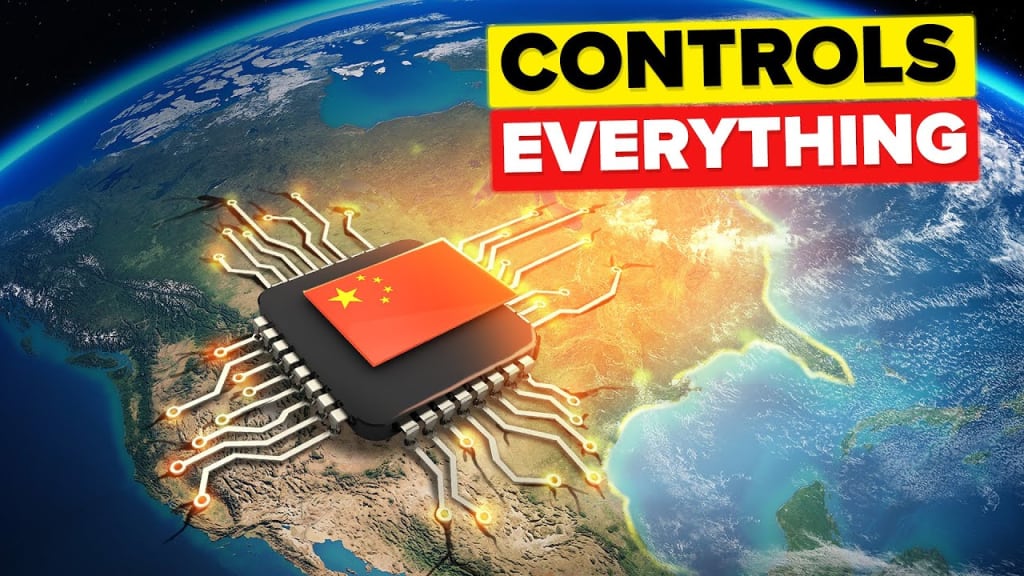How Few Companies Rule the World With Just One Small Device
There is one critical resource that will keep the globe turning in the future, yet unlike oil, only a few corporations will be able to supply it. See how these little electronics manage virtually everything in this unbelievable narrative! 📡💎🔩💎📡

There is one critical resource that will keep the globe turning in the future, yet unlike oil, only a few corporations will be able to supply it. See how these little electronics manage virtually everything in this unbelievable narrative! 📡💎🔩💎📡
The world will run on one essential resource in the future, and unlike oil, very few businesses will be able to supply it. The brains of nearly every electrical device you use are microchips. These tiny pieces of technology have grown in value despite having silicon as their foundation, which is derived from the frequently occurring silica sand. Why do all the chips, and certainly all the best chips, seem to be concentrated in only a few countries? Even the extremely wealthy and technologically advanced US and China aren't on top of the world when it comes to chips, which is what we want to know today if these things are so crucial to the future of humanity. And how will these chips give the nations that possess them the upper hand?
What's going on? In 2022, a headline in the New Statesman declared, "The war over semiconductor chips will determine the future world order." Taiwan was mentioned in the subheading because, according to the article, it is the world leader in the production of microchips. With all due respect, Taiwan is not exactly a superpower. It wasn't that long ago that the average American would respond with "Tai-what" when asked about Taiwan. They'd probably compare it to Thailand, where there are beautiful beaches and a well-known brutal martial art. Taiwan, a giant in its own right, is now well known to everyone. People who probably didn't even know the Mandarin Chinese spoken in Taiwan until recently are now talking about it.
The same people probably now comprehend that Taiwan is considered to be a province of China and should be governed by the Chinese Communist Party. They also likely understand that Taiwan's official name is the Republic of China. For the purposes of this narrative, it is crucial to know all of this. In fact, the USA and the majority of other countries do not even formally recognize Taiwan as a sovereign state. However, if you ever travel to Taiwan and claim to be Chinese, be prepared to have a plate of foul-smelling tofu shoved in your face. Taiwan, they'll say, is Taiwan. At the moment, you can learn what the US officially thinks about Taiwan by visiting the website of the US Department of State.
Although the United States and Taiwan do not have diplomatic ties, our unofficial ties are strong, as you will read. The foundation of our friendship and the driving force behind growing U.S.-Taiwan relations are shared values, extensive economic and commercial ties, and close interpersonal relationships. You can disregard the majority of that passage and concentrate on the crucial and accurate portion, which includes the words "deep commercial and economic links." Taiwan knows it has things the US wants, so it can claim to have strong friendships and people-to-people ties while also benefiting from US economic and possibly military support. If you think we sound cynical, just keep in mind that interpersonal relationships aren't typically the foundation of international relations.
That is simply how things are in the world. If you don't believe us, read historical accounts of how once-friendly nations that had solid relations turned into arch enemies willing to blow each other to pieces when something occurred that jeopardized their financial security. Globally speaking, friendships typically don't last. They are currently like two peas in a pod because Taiwan is assisting the US in securing its economic future. Taiwan is the world leader in the production of microchips, as we just mentioned, and that is the only explanation for this. China is no different. The only component of its economic machinery is Taiwan. They are not friends in the traditional sense; rather, they are very significant economic trading partners.
Taiwan is currently embroiled in a trade war that has evolved from a technological arms race because of its prowess at producing the chips that, as we have previously stated, will give nations the upper hand in the global marketplace. Taiwan produced nearly 90% of the most technologically advanced chips and approximately 65% of the world's microchips in 2022. Those sophisticated ones are required for all the most recent developments in artificial intelligence, including numerous military-related tools. Low-end chips may be the only thing keeping your washing machine spinning for an hour. Although not all chips are created equal, all are required. Taiwan has left China and the US in the dust when it comes to mass producing the most sophisticated chips, despite the fact that they are currently able to produce their own.
They can all produce excellent chips, but Taiwan is far ahead of South Korea, Japan, and some regions of Europe. As they intensify their trade war and talk of a future conflict between the superpowers increases, Taiwan is unavoidably becoming increasingly important to both China and the US, which together produce between 5% and 12% of the world's chips. It's possible that some of our viewers in the US and even China are now wondering, "Wait a minute, why did we let ourselves get so far behind when we knew that advanced microchips would be one of the most important commodities on planet Earth?" Consider what might happen if Taiwan suddenly ignored China or the US, leaving those nations behind in the technological arms race.
How negligent of China and the US to have allowed Taiwan to gain such a significant lead. Actually, the US was a pioneer in chip technology. How do you suppose we came up with the name Silicon Valley? Chips are typically made of silicon. The US's decline is most easily explained by the fact that it rested on its laurels while nations in Asia went into hyper drive with chip development. The governments of Taiwan and South Korea invested a lot of money in the manufacturing and development of chips, which helped those nations' businesses surpass those in the US. However, the lower wages in those countries are another factor. Americans are proud of their liberal democracy and how strongly it values individual rights, but when you have fewer rights, you can force people to work longer hours for less pay.
It costs a fortune to make chips, and many people must be paid to put in the long hours required. In other words, this was more suited to Asian countries than the US. It makes sense that they were able to achieve that leapfrog strategy because their chip plants were operated at a significantly lower cost. The government was not, however, assisting American businesses. The majority of Americans believed that it would be fine to rely on Asia for their chip needs so that they could devote more of their time to developing and designing chips rather than actually producing them.






Comments
There are no comments for this story
Be the first to respond and start the conversation.